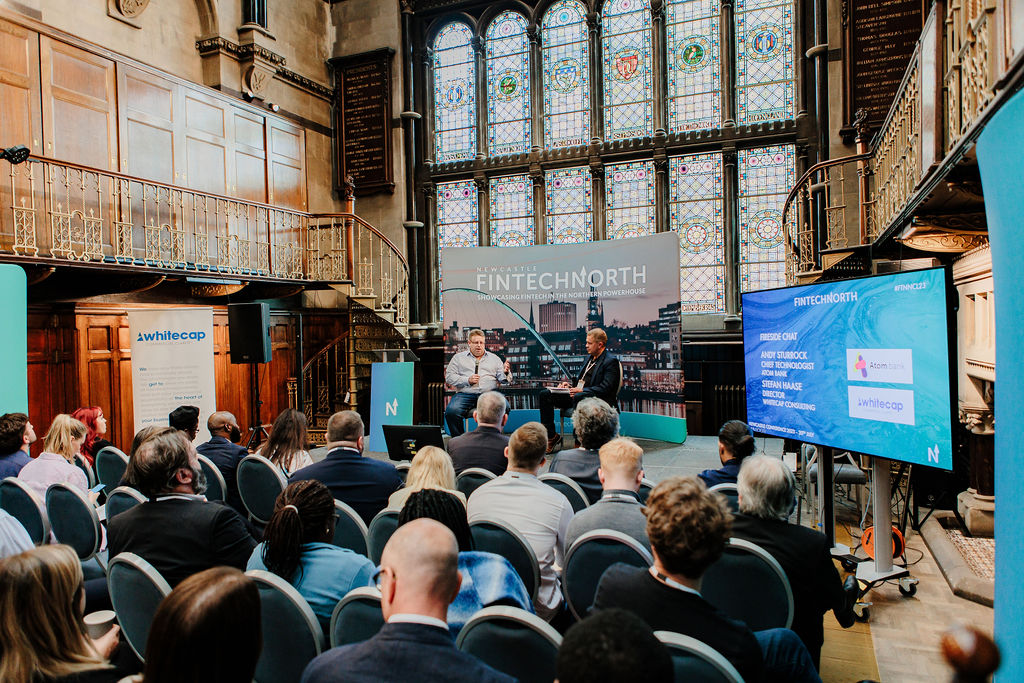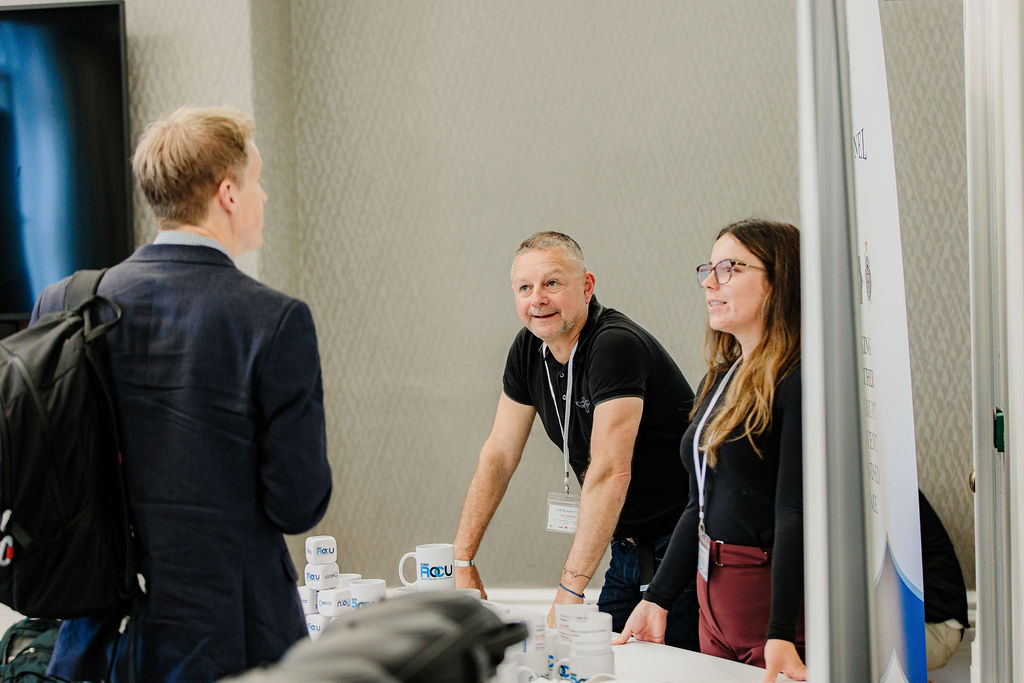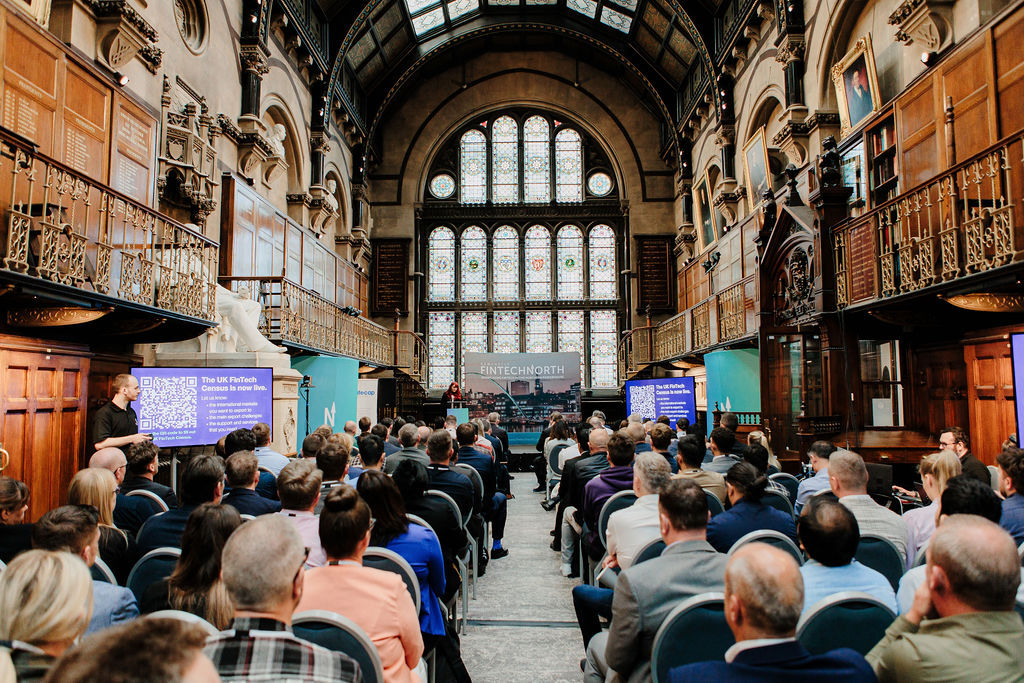Northern FinTech Summit Day 1: Write-Up
The Northern FinTech Summit – Day 1
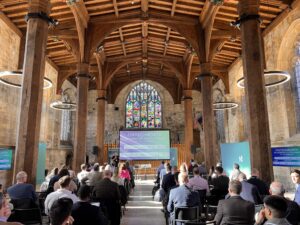
On the 10th and 11th of October, the Northern FinTech community came together for a milestone event for FinTech North: The Northern FinTech Summit, the organisation’s first-ever two-day event. The Summit had a pan-northern focus and a national audience, covering four key themes across the two days including Market and People on Day 1 and Money and Tech & Product on Day 2.
Click here to read about Day 2 of the Summit.
Click here to read about the Northern Showcase, part of the Tech & Product segment.
The event was hosted in partnership with Barclays Eagle Labs, the University of York, Rise, Created by Barclays, Squire Patton Boggs, as well as the North’s inward investment agencies, MIDAS, West Yorkshire Combined Authority, Invest North East England, and Invest Liverpool City Region.The Market segment was sponsored by York Central and the Money segment was sponsored by Marqeta.
The Summit saw fantastic engagement from all across the north and beyond, with 80 per cent attendance on each day, as well as a buzzing and jam-packed room at the Northern Social on the evening of Day 1. We were delighted to be joined by over 90 delegates on Day 1 and over 80 on Day 2, who were a highly engaged and focused audience.
On Thursday the 10th, delegates came together at the iconic Guildhall in central York, a historic meeting place in the city and a venue representative of a fusion of collaboration, innovation, academia and financial services, now serving as both a University of York building as well as a Barclay’s Eagle Lab.
Joe Roche, FinTech North’s General Manager kickstarted the morning by welcoming delegates, sharing some background on the organisation’s work and strategy to date, on the thinking behind the milestone event.
He then welcomed to the stage Christopher Lunardi, Ecosystem Manger at Barclays Eagle Labs to the stage to provide a short welcome and overview of the myriad of support services offered by the Eagle Labs.
Following this, Kiran Trihan, Pro-Vice-Chancellor for Enterprise, Partnerships and Engagement from the University of York provided a warm welcome on behalf of the University, highlighting the importance of continued collaboration between industry and academia.
Market Segment – York Central
First to the stage in Market segment, sponsored by York Central was Ed Twiddy. Ed is a Non-Executive Director at York Central as well as Co-Founder of Atom Bank.
Ed began by highlighting the work underway at York Central, a project focused on transforming the city’s future through thoughtful development. He shared insights into the ambitious plans, which centre on fostering ‘coherence and connectivity from the off.’
Ed emphasised that the development aims to create a vibrant and sustainable environment for businesses, residents, and visitors—blending the city’s rich heritage with a vision for modern infrastructure.
A key element of the plans involves visualising a community ‘built on technology’ that nurtures future growth and innovation. Ed addressed the current challenges facing York’s business landscape, noting that the city has ‘the lowest business birth rate of any northern city.’ Reversing this trend, he explained, is essential—particularly in the FinTech sector, where technological development plays a critical role in enabling start-ups and attracting investment.
The vision for York Central is to position the city as a hub for innovation, ensuring it has the technological foundations necessary to compete with other leading northern centres. Ed highlighted how the new development is designed not just as a space for commerce but also as a thriving community that encourages entrepreneurship and collaboration.
Market Segment – Whitecap Consulting
Julian Wells, Director at Whitecap Consulting, gave a brief history of the evolution of regional FinTech hubs in the UK, explaining how the sector had grown nationally since its early days as a London-centric hub. He shared insights from Whitecap’s recent report on 250 regionally-based FinTech scaleups, which was published in partnership with Innovate Finance and Streets Consulting. Julian reflected on Whitecap’s current view of what is happening in the market, highlighting challenges in the funding but balancing this with the observation that demand for FinTech engagement and digital transformation from the established financial services sector remains strong.
Market Segment – Aviva
After this, Suzanne Lawson, Start-up Partnerships Manager at Aviva, explored the value of partnerships between established companies and start-ups. She highlighted Aviva’s role in sourcing and collaborating with founders and investors, with a focus on preparing for the future. Suzanne stressed the importance of founders being ‘wedded to the problem, not just the solution,’ emphasising the need for adaptability throughout the process.
She also underlined the significance of building social capital, knowledge, and experience to foster innovation, alongside cultivating a strong innovation culture within organisations. One of her key messages was to ‘build engagement from day one,’ ensuring that collaboration starts early and remains a priority. Suzanne positioned these partnerships as valuable opportunities for co-creation, where incumbents and start-ups can solve challenges together in dynamic and impactful ways.
Market Segment – Barclays Eagle Labs and Business Durham
Christopher Lunardi then returned to the stage for an insightful fireside chat with Jenny Halford, Sector Development Manager at Business Durham, who explored how the North is building world-class incubators and accelerators.
Jenny kicked things off with a video showcasing the breadth of support programmes offered by Business Durham, illustrating their commitment to fostering innovation in the region.
A key theme was how to maximise impact with limited resources. Jenny acknowledged the challenge of ‘trying to be everything to everyone’ and stressed the importance of focusing on specialised support rather than spreading efforts too thin. This approach, she noted, allows for more meaningful outcomes despite resource constraints.
The conversation also touched on some of the challenges faced by the FinTech sector, including the fact that many businesses don’t initially identify with FinTech, making it harder to engage them in relevant programmes.
Chris and Jenny discussed the importance of tailored accelerator models, suggesting that smaller, more focused bootcamps—featuring ‘tough love’ and an ethos of ‘fail fast’—can deliver real value by saving time and helping participants pivot quickly.
They also highlighted the role of collaboration between start-ups, with Jenny emphasising the value of peer-to-peer learning and external insights that accelerators can provide. Looking forward, the speakers stressed that collaboration across industries and regions will be essential for future success, especially in the digital age.
They concluded by emphasising the importance of champions and mentors within businesses to help guide and support innovators on their journeys.
Market Segment – CFIT
Next, a pre-recorded message from Ezechi Britton MBE, CEO of CFIT, was shared, where he gave an overview of the organisation and their ties to the North, having been launched in Leeds in 2023. He shared some information on their work to date, involving open data and finance and it’s massive potential for supporting the UK economy.
Market Segment – Rise, Created by Barclays
Darren Earnshaw, Technology Director at Barclays, delivered a forward-looking presentation on how technology and innovation are reshaping the future of consumer banking. He explored key trends including hyper-personalisation, artificial intelligence (AI), open banking, and embedded finance, emphasising how evolving consumer expectations are driving the development of tailored financial products. Darren explained that customers now expect to choose ‘how and when they engage’ with seamless digital services supporting both everyday interactions and major life events.
Darren highlighted the shift toward more ‘adaptive, personalised, and relevant journeys’ with real-time prompts and contextual nudges shaping consumer experiences. He described future banking as ‘near-human,’ with natural, conversational services embedded into people’s lives. An omnichannel approach—where customers can switch between platforms with a consistent experience—was also identified as key to meeting modern demands.
The presentation covered new payment innovations, including Buy Now Pay Later (BNPL) and peer-to-peer transactions, as well as the potential role of Central Bank Digital Currencies (CBDCs) in reshaping payments. He asked a provocative question: Do you need to be a licensed bank to offer financial services? With Banking as a Service (BaaS) growing, Darren suggested that both neobanks and legacy institutions may need to reconsider their roles in the evolving ecosystem.
Darren also addressed forthcoming challenges and opportunities including post-Brexit regulatory divergence, and the Payment Systems Regulator’s (PSR) new requirements for Authorised Push Payment (APP) fraud reimbursements.
Referring to the APP fraud changes, he noted, ‘We’ve never seen so many FinTechs up in arms about a change in a regulation.’ Darren acknowledged that the new framework will help protect consumers, but it was likely to change the shape of fraud not reduce it.
AI was another central theme of the presentation, with Darren describing it as a disruptor that could revolutionise consumer banking. As technological innovation accelerates, Darren concluded by emphasising that financial service providers must remain resilient, adaptable, and collaborative. He underscored the importance of balancing innovation with security and consumer trust, while also promoting financial inclusion and accessibility.
Market Segment – International Market Panel
Concluding the Market segment was a highly engaging panel titled: ‘Crossing Continents: Navigating Global Growth in FinTech,’ moderated by Stefan Haase, Director at Whitecap Consulting, who was joined by:
- Katie Ramsey, Head of FinTech at the Department for Business and Trade (DBT)
- Nikki Foster Le-Grys, Regional Director UK & Europe at Acclime
- Liam Spence, Senior Vice President of Franchise Innovation at Mastercard
- and Charlie Clark, Business Development Executive at Panintelligence
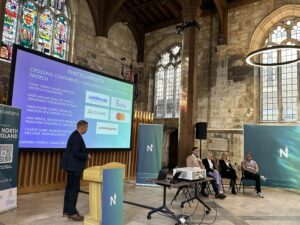
The discussion focused on how FinTechs can successfully scale across continents, with a particular emphasis on international markets, regulatory landscapes, and learnings from building global products.
Stefan highlighted the UK’s role in driving global economic growth through FinTech, noting that the UK leads ‘two global tech races – Formula 1 and FinTech.’
Katie emphasised the value that government support can provide to FinTechs by helping them understand market opportunities and advising on the best locations to soft-launch their products.
Nikki shared her experience helping organisations expand into the Asia-Pacific (APAC) region, which offers exponential opportunity—particularly in underbanked areas. However, she cautioned that the cultural and regulatory challenges in some markets can be difficult to navigate, particularly in Southeast Asia. Charlie Clark discussed his experience expanding Panintelligence into the US, where ‘once you have a foot in the door, the process moves faster’—but the challenge lies in getting that initial entry.
Liam shared that FinTechs must recognise that expectations vary significantly across markets; what works in the UK might not necessarily resonate elsewhere. He advised FinTechs to ‘build products with global scalability in mind,’ emphasising the need to balance local adaptation with global relevance.The panel also explored regulatory complexities when operating internationally. Katie explained that the UK’s regulatory framework is seen as a ‘gold standard,’ with many countries modelling their own regulations after it. However, she stressed that it is essential for FinTechs to understand the cultural context they are entering, as regulations are only one part of the puzzle. Nikki added that FinTechs should carefully consider their minimum viable product (MVP) for each market and choose a strategy that best fits the local landscape.
There was also discussion around the importance of networks and partnerships. Katie advised FinTechs to engage early with the venture capital community, as ‘VCs are always on the lookout for companies that align with their portfolios.’ Charlie emphasised that once FinTechs establish a relationship in a new market, they should make the most of it through referral schemes and local channels. Nikki echoed this by stating, ‘Government is government and business is business.’ While governments can offer valuable support, FinTechs must take ownership of their go-to-market strategies to succeed.
The conversation turned to specific markets where UK FinTechs might find opportunities. Singapore, Australia, and Saudi Arabia for example, were highlighted as leading FinTech hubs with advanced regulatory sandboxes for open banking and payments. Meanwhile, the panel noted that while Southeast Asia presents significant opportunities, breaking into these markets can be difficult due to cultural and language barriers.
Liam also touched on innovation in payment technologies, noting that Mastercard is particularly focused on ‘merchant acceptance innovation’ as FinTech evolves globally.
In closing, the panel encouraged FinTechs to think beyond borders and focus on building products and partnerships that create value locally and globally.
The session concluded on a positive note, with panellists emphasising that while the road to international expansion can be complex, the right partnerships and strategic planning will help FinTechs thrive on the global stage.
People Segment – Skills Overview and Panel
Kicking off the ‘people’ section, the second theme of the day, Dan Rajkumar, Director at FinTech North and Silas Ozoya, Talent Upskill Associate from FinTech North came to he stage to provide an overview of the organisation’s skills work. Dan elaborated on FinTech North’s strategic aims for the year with the initiative, and Silas followed by provide an update on the work so far, noting that at the heart of the work was an aim to connect the talent with the employers and support sector growth.
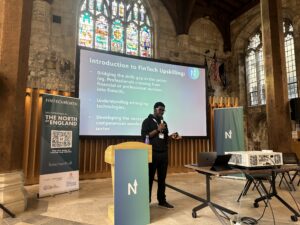
Following the presentation, a panel titled ‘How do we Secure the Future of our Sector: FinTech skills’ saw insights from a group of industry experts, each with unique areas of specialism:
- Moderator: Ellie Kirkman, FinTech PR Consultant, Started PR
- Ian Bolton, Head of Learning Programmes, Tech Skills UK
- Steve Kevan, Co-Founder, FinPact
- Rashmi Arora, Associate Professor in Development Economics University of Bradford
- Michelle Burton, Head of Employment and Skills, West Yorkshire Combined Authority
- Rachel Kenyon, Business Engagement Manager, the University of Manchester
The discussion began with Michelle emphasising the need to make careers in FinTech more attractive. ‘Our job is to amplify and raise the profile of the sector,’ she stated, highlighting the importance of collaborating with educational providers to develop clear pathways into the industry. While she acknowledged the progress made, she noted that ‘there is a long way to go.’
Ian then discussed the importance of accreditation in creating courses that offer pathways into tech careers, advocating for the development of degree apprenticeships tailored to the needs of the sector.
Rashmi shared an inspiring story of a student who introduced the concept of FinTech to her classroom, sparking widespread interest among her peers.
Rachel added to the conversation by addressing the importance of bridging the gap between academia and industry. She noted that while there have been no specific courses focusing on FinTech in the past, various disciplines can connect and form a robust network that ultimately supports the sector’s growth.
Steve highlighted that finance is increasingly becoming a horizontal function across many sectors, further underscoring the need for interdisciplinary approaches.
Michelle elaborated on the reasons why FinTech is a popular reskilling route, stressing the importance of being open-minded about retraining, particularly for those looking to build resilience and seize opportunities in their local communities.
Ian shared insights on the effectiveness of boot camps and the diverse skill sets that are necessary in FinTech beyond mere resilience. He noted the ‘exciting challenges’ that come with the industry, allowing professionals to push boundaries within a safe space. ‘It’s a sector that they feel they can impact because it’s new and flexible,’ he added, reflecting on the evolving nature of FinTech pathways.
Rachel pointed out that new venture capital (VC) firms are keen to incorporate more applied learning, providing exposure to different disciplines and real-world environments. This approach emphasises the need for transferable skills that are essential in the fast-paced world of FinTech.
The panel also tackled the importance of Environmental, Social, and Governance (ESG) factors, with Rashmi discussing how the financial crisis brought ethical issues to the forefront. ‘Ethical issues often arise as a result of problems; regulation also plays a critical role in shaping these discussions,’ she explained.
When discussing the appeal of start-ups, Ian noted that young people are increasingly driven by opportunities to work in dynamic environments where they can adapt and evolve. However, Michelle raised a significant concern: the predominance of SMEs in the sector, which are often perceived as risky by prospective employees. To address this, West Yorkshire is launching a graduate SME scheme to highlight the benefits of peer support and cohort learning.
The panel also delved into the anxieties young people face about pursuing careers in FinTech. Ian stressed the importance of building a clear pathway for individuals, acknowledging that many young people are concerned about job security. He remarked, ‘It’s crucial to change perceptions—particularly around crypto and blockchain—by improving education at the grassroots level.’
Finally, Ian suggested that initiatives like apprenticeship programmes could be developed, linking Level 3 apprenticeships to degree apprenticeships to provide a clearer progression for individuals entering the industry. Rachel reiterated the role universities can play in bridging the gap between academia and industry, emphasising their desire to inform research with real-world applications and experiences.
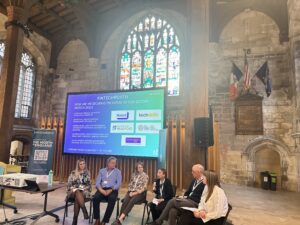
People Segment – West Yorkshire Combined Authority
Asma Iqbal, Board Member and EDI Champion at the West Yorkshire Business Board and Partner at Chadwick Lawrence, was next to the stage, delivering a powerful keynote on ‘Inclusive Innovation: The Critical Role of EDI in the Future of FinTech.’ Asma highlighted the transformative potential for Equality, Diversity, and Inclusion (EDI) in the FinTech sector, stressing the power of inclusion and the devastation that can occur when it is absent.
She emphasised the necessity of having diverse voices at the table when discussing change, stating that this is imperative for the industry. Asma articulated why EDI matters in FinTech, noting that the future relies on technological innovation and a commitment to EDI. Research shows that diverse teams perform better, which is crucial as FinTech plays a central role in the economy.
Moreover, she pointed out that there is a need to commit to a more inclusive economy, where women are leading in capital efficiency. Asma also underscored the importance of ethics behind brand values, reinforcing that these principles should be integral to the industry’s future.
People Segment – Company Culture Panel
The final panel of the day, titled ‘Cultivating Success: The Impact of Culture on Fintech Performance and Innovation,’ brought together the following speakers:
- Sam Turner, CPO at Lenvi
- Ed Twiddy, Co-founder of Atom Bank
- Bianca Spruit, Founder of Sprout Coaching
- James Taylor, Managing Director of Corecom Technology Academy
And was chaired by
- Dawn Dunn, Digital and Tech Sector Lead at Invest North East England
The panel began with insights from James who emphasised the importance of diversifying tech teams to enhance innovation and performance. He reflected on his experiences helping organisations build strong teams, highlighting that culture is about authenticity. Reflecting on his own experience, James noted that tech leaders often spend significant time embedding themselves into their clients’ cultures, which requires a delicate balance between internal values and external expectations.
Bianca shared her expertise on working with leaders to cultivate high-performing, inclusive teams. She highlighted the negative effects of rigid cultures and stressed that cultural development should be a collective effort rather than solely dictated from the top. Bianca emphasised the need for an equitable approach to culture, where every employee feels empowered to contribute and voice their ideas, fostering a supportive environment that embraces questions and failures as part of the learning process.
Sam discussed the challenge of building great teams within a newly merged organisation, where three separate businesses were spliced into one. She reiterated the importance of cultural alignment and engagement, stating that a positive culture leads to increased productivity.
Ed contributed by discussing the role of social investment strategy and public policy in FinTech. He shared his experience of implementing a four-day working week in his organisation, which he observed resulted in higher employee engagement and satisfaction. Ed underlined that cultural change is essential for empowering consumers, especially in finance, where asymmetries often exist. He echoed the sentiment that the focus should remain on improving customer experience and operational efficiency.
The discussion delved into how culture impacts performance, particularly in the rapidly evolving landscape of FinTech. The panelists collectively affirmed that diversity of thought is critical for fostering innovation and that openness and transparency within organisations can drive cultural shifts. They also explored the implications of AI on workplace culture, weighing its potential as both an opportunity and a threat.
In conclusion, the session highlighted that to successfully navigate cultural dynamics, FinTech companies must cultivate an inclusive environment that prioritises employee well-being, embraces diversity, and remains adaptable to change.
People Segment – Project Nemo
The final segment in the people session was a thought-evoking fireside chat with Prerna Goel, Founding Member of Project Nemo and moderated by Rachel England, FinTech North’s Events Coordinator.
The discussion covered prevalent around disability inclusion, including the effects of ablism, barriers to hiring processes, positive workplace environments, ways to avoid tokenism, and schemes organisations can get involved in to ensure positive recruitment processes and employee retention.
Northern Social
As Day 1 one of the Summit drew to a close, delegates came together for a vibrant evening network session next door to the Guildhall, at Lendal Cellars, another iconic York venue.
We’d once again like to share a massive thanks to everyone involved, Thank you to our partners, Barclays Eagle Labs, Rise, Created by Barclays, The University of York, Squire Patton Boggs, Invest North East England, MIDAS, Invest Liverpool City Region, and West Yorkshire Combined Authority, ‘Market’ sponsors, York Central, ‘Money’ sponsors , Marqeta, and of course, all of our wonderful speakers for sharing all of your organisation’s fantastic work and innovation.


